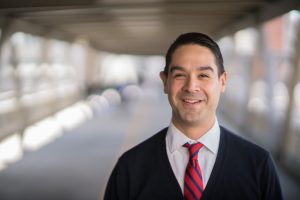 From the University Gazette
From the University Gazette
UNC Lineberger’s Shawn Hingtgen, PhD, was one of four highly promising UNC-Chapel Hill faculty members who have been awarded the Phillip and Ruth Hettleman Prizes for Artistic and Scholarly Achievement by Young Faculty. This year’s prizes were announced at the Oct. 12 Faculty Council meeting.
The Hettleman Prizes for Scholarly and Artistic Achievement by Young Faculty, made possible by the generosity of Phillip (UNC Class of 1921) and Ruth Hettleman, recognize scholarly and artistic achievement by junior tenure-track, or recently tenured, members of the faculty. Four recipients will be selected for the awards of $5,000 each.
Assistant professors in their third or fourth years are eligible for nomination who have been recommended for reappointment for a second term, as well as second term assistant professor, and any associate professor who will not have been in rank as an associate professor for longer than three years at the end of this academic year.
This year’s awards went to Hingtgen as well as Joaquin Drut, PhD, associate professor in the UNC-Chapel Hill Department of Physics and Astronomy; Juan Song, PhD, assistant professor of pharmacology and member of the UNC Neuroscience Center; and Gabriel Trop, PhD, associate professor in the UNC-Chapel Hill Department of Germanic & Slavic Languages.
Hingtgen is an associate professor in the UNC Eshelman School of Pharmacy with a joint appointment in the department of neurosurgery in the UNC School of Medicine, as well as a member of UNC Lineberger. He came to Carolina in 2012, and is working on harnessing the potential of stem cells to develop new and better methods for treating terminal cancer.
Michael Jay, chair of the pharmacy school’s Division of Pharmacoengineering and Molecular Pharmaceutics Division, described Hingtgen as an “energetic and open collaborator” who has an innate ability to ask his research questions from different perspectives and apply tools and techniques from various disciplines to produce groundbreaking results.
The key to Hingtgen’s treatment is “skin flipping,” a technology for creating neural stem cells from skin cells. That technology won a Nobel Prize in 2012. The first step is to harvest fibroblasts — skin cells responsible for producing collagen and connective tissue — from the patient and then reprogram those cells to become what are called induced neural stem cells. Working closely with an interdisciplinary team of researchers and clinicians, Hingtgen showed how these neural stem cells can hunt down and deliver cancer-killing drugs to glioblastoma, the deadliest malignant brain tumor in adults, in initial preclinical studies published in Science Translational Medicine in 2017.
“His work has changed the field and is the basis of work in many cutting-edge laboratories around the world,” Jay said.
In 2015, Falcon Therapeutics was founded to advance the discovery generated in Hingtgen’s lab toward the clinic to redefine the care for patients with glioblastoma and other cancers that are currently incurable.
Hingtgen earned his doctorate at the University of Iowa and completed a postdoctoral fellowship at the Massachusetts General Hospital/Harvard Medical School.
Read more about the other Hettleman winners from the UNC College of Arts and Sciences and the UNC Eshelman School of Pharmacy here.
